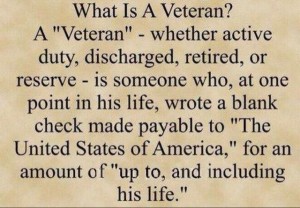Gary Sinise in Forrest Gump. Tom Cruise in Born On The 4th of July. Two great American actors in two powerful films with incredible imagery. It’s not Hollywood’s fault that our society is so dialed in to their productions, but the reality is many Americans’ mental image of a Veteran is skewed by these memorable characters or others like them.
If there is a word that gets more verbal mileage per syllable than any other used (or abused) in political conversations, it just might be the word veteran. When used properly, it’s a word that can inspire national interest; a rallying point on an issue due to the honorable demographic it should immediately force us to visualize. It’s a word that virtually every American can at least associate with, regardless of what they think it means.
vet·er·an // noun // someone who…
According to Merriam-Webster’s Online Dictionary, veteran has two basic definitions: 1a) an old soldier of long service or 1b) a former member of the armed forces and 2) a person of long experience usually in some occupation or skill (as politics or the arts).
With widespread usage in sports like the UFC’s description of their emcee as the “veteran voice of the octagon” or the NFL’s “veterans helping out this year’s rookies,” it’s fairly easy to see how most Americans have other things on their minds. Statistically it’s easy to back up as less than 1% of the US population currently serve in the military today and roughly 7% have ever served. Put another way, 93% of the nation are non-veterans who probably think of the word veteran in the corporate context of experience.
So given all the above factors, how do we get people in general to lose the image of an obscure citizen wasting away into bitter existences like Sinise’s Lt Dan character before his boat-storm epiphany?
Start by keeping the public math in perspective. Recent reports show something like 1 in 5 homeless Americans are veterans. Many will immediately calculate 20% and then incorrectly associate that 20% of veterans are homeless. It’s a common phenomenon around the office water cooler or coffee station…correct it when you can.
Not everyone leads a Hurt Locker or American Sniper lifestyle either. Again the sensationalism with selling a film or social media anecdotal reactions tend to fuel people’s perceptions, thus their subsequent reality.
However, the reality of government employment, specifically in the GS system, has acknowledged what a veteran brings to the team by way of veterans preference points. Perhaps controversial to some civil servants, a less threatening perspective is simply to view this “advantage” as a person who has already served significant time in the Federal system.
If you have the opportunity to hire, partner or work with a veteran, I’d ask you to consider the depth of related actions a person must take in the definition that follows. And then remember this ain’t the movies, these folks are real and they’re great team mates.

Paul Grugin is part of the GovLoop Featured Blogger program, where we feature blog posts by government voices from all across the country (and world!). To see more Featured Blogger posts, click here.





As a Veteran of OIF as a USMC Infantryman, I find this article to be well written and educational for those out there that have not had the privilege to work with a Veteran. They have a broad knowledge, great experiences not found in a school and a thirst for leadership.